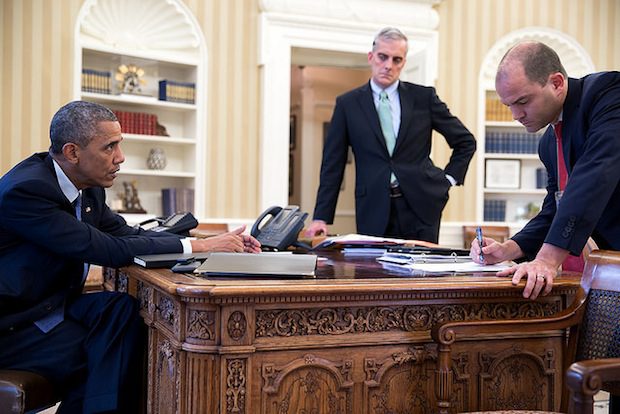Obama and the Escalation Trap

Frederik Logevall and Gordon Goldstein make a depressingly plausible case that further escalation in Syria is likely:
But the point is not about biography; rather, it’s about the inability of a president, once committed to military intervention, to control the course of events. War has a forward motion of its own. Most of Johnson’s major steps in the escalation in Vietnam were in response to unforeseen obstacles, setbacks and shortcomings. There’s no reason the same dynamic couldn’t repeat itself in 2014.
And there is a political logic, too: Then as now, the president faced unrelenting pressure from various quarters to do more, to fight the fight, to intensify the battle. Then as now, the alarmist rhetoric by the president and senior officials served to reduce their perceived maneuverability, not least in domestic political terms [bold mine-DL].
Vietnam comparisons are often perilous and potentially misleading, but the point the authors want to make shouldn’t be overlooked because of that. Presidents trap themselves into pursuing unwise escalation in foreign wars because their earlier decisions and past rhetorical overkill seem to compel it. Unfortunately, the administration has repeatedly combined careless rhetoric with a tendency to yield sooner or later to hawkish pressure. By indulging in the former (e.g., talk of “destroying” ISIS or claiming it is an “imminent threat to every interest we have”), Obama and his officials give hawks the opening they need to demand more aggressive measures. Having already endorsed most of the hawks’ assumptions about the conflict, the administration makes it very difficult for itself politically not to give in to those demands. At best, Obama has created an open-ended conflict that his successor will be forced to continue. Given Washington’s bias in favor of throwing more resources at a problem when a policy hasn’t succeeded, it is quite likely that the next administration will conclude that Obama’s policy didn’t “work” because it was insufficiently aggressive. The depressing thing about all of this is that the eventual escalation of the war is entirely foreseeable, but no one seems to think that the new war could be halted now before these disastrous, costly decisions are made.
The true shame is that the U.S. doesn’t need to be fighting this war, and it is not being made more secure by fighting it. We already know that the war’s stated goal is unrealistic, and yet the U.S. is being drawn ever deeper into that war in pursuit of that mirage. The easiest way to escape the escalation trap is to recognize this and stop chasing a goal that can’t be reached. Unfortunately, there is no reason to expect that Obama will do this.
Comments